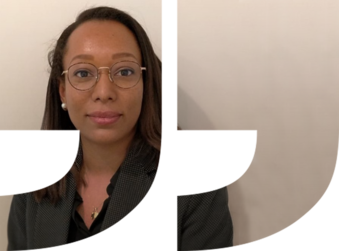The profession of actuary
The profession of actuary is an important one in the field of applied statistics
This risk management specialist conducts economic, financial and statistical studies to assess risks before designing or modifying insurance or life and disability insurance contracts.
They set the rules and scales for contract pricing by tracking their effective profitability. This expert works mainly for banks, insurance companies, retirement and life and disability insurance funds.
They may also be hired by financial institutions or economic study departments in banks and large companies. Becoming an actuary requires five years of post-secondary education in mathematics, statistics and economics. You must also obtain an actuary diploma from one of the institutions recognized by the French institute of actuaries, of which Université Paris Dauphine – PSL is one.
Comments from alumni
“There is no routine in the actuary profession,
and that’s what makes it interesting!”

What does an actuary do in practical terms on a daily basis?
That’s a very good question. I would say there is no routine in the actuary profession, and that’s what makes it interesting. Depending on the sector of activity, an actuary may find themselves calculating technical provisions or setting product prices for example.
What part of this profession interests you most?
Its diversity. I began as a trainee in the “Life” sector and for several years now I have been working in the P&C (Property & Casualty) sector There are a lot of opportunities and potential gateways to other areas.
Why did you choose Université Paris Dauphine – PSL for your training?
When I was considering actuarial studies, Université Paris Dauphine – PSL seemed like an obvious choice. And in fact having six months to write the master thesis via an end-of-year internship appealed to me immediately.
What is the ONE crucial skill that you learned during the Actuarial Science Master's degree to work in this sector, and that still serves you today?
The Actuarial Science Master’s degree year 2 classes are very high quality, but if I had to name a single skill acquired during this program, it would be the ability to quickly understand the salient points of a project.
What advice would you give a student wishing to embark on a career as an actuary?
I would say that it’s a wonderful plan and that you should be equipped to learn and be curious and disciplined.
SANDRINE BABIN
P&C ACTUARY - SOCIETE GENERAL ASSURANCES
His academic path:
Master's degree in Actuarial Studies
Roles and missions of an actuary
This risk engineer constantly assesses and anticipates risks to ensure profitability of their organization’s business. As an executive in an insurance or life insurance company, a financial department or banking institution. They work in collaboration with the technical studies team and with product managers and subscribers to support them in marketing new contracts, clauses or pricing conditions.

Daily
tasks
An actuary may perform these tasks on a daily basis:
- Conduct risk, profitability and solvability studies
- Manage, coordinate and contribute to actuarial monitoring in their areas of responsibility
- Anticipate all risks
- Help with the technical design of insurance, investment or savings contracts
- Establish pricing scales, causes and risk categories for contracts
- Develop new modeling tools and methods for greater efficiency and accuracy
- Collaborate with Management and teams in charge of subscription to facilitate marketing and follow-up
- Search for solutions to emerging problems with a forward-looking approach
Salaries and career development
The mean gross annual salary for a junior actuary is between €39,000 and €45,000. Salaries are revised regularly and may reach between €50,000 and €60,000 with 5 years of experience.
A senior actuary may have significant management duties. They may become an actuarial manager, administration manager or product manager. In late career, it is not unusual for an actuary to become a CEO.
With a background as a statistics expert and sharp market analyst, the career outlook for an actuary is not limited to internal promotion. An experienced actuary could also make a career change to become a finance consultant or data analyst.

Skills
required
- Methodical, rigorous and precise mindset
- Ability to research, centralize and process all data potentially connected to the study subject
- Mastery of statistical modelling and Big Data tools
- Analytical mind and ability to summarize complex topics
- Great curiosity
- Ability to work independently as well as in a team
- Creative force
- Knowledge of Machine Learning techniques
- Fluent in English and ideally another language
- Ability to create appealing reporting material
Which studies to become an actuary?
Becoming a quantitative analyst in market finance requires solid knowledge in mathematics, computer science and statistics. This profession requires five years of post-secondary education and a Master’s degree in mathematics compatible with the criteria of the French institute of actuaries.
This allows future graduates to acquire solid knowledge of theoretical mathematics, applied to actuarial, financial and probability modeling tools.
Program to become an actuary at Université Paris Dauphine – PSL
Université Paris Dauphine – PSL offers a three-year actuary training program. The third year of the Bachelor's degree then the Master's degree in Mathematics and Applications with the Actuarial Studies specialization provide all the skills needed to enter this profession.
The actuarial diploma is completed at Dauphine-PSL and awarded with the consent of the French institute of actuaries. Graduates of this program can practice in France or abroad. English-speaking countries in particular seek many experts in statistics, economics and applied mathematics.




